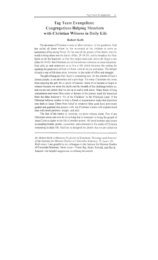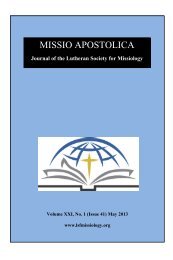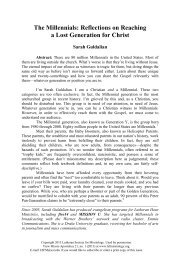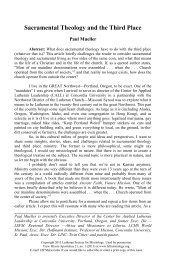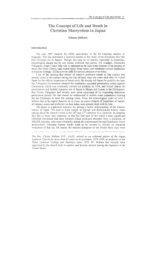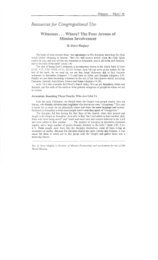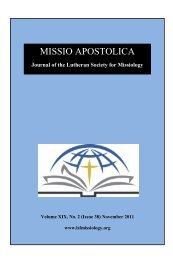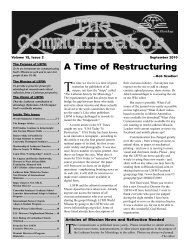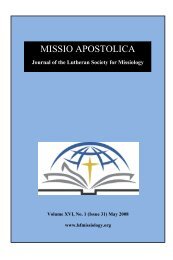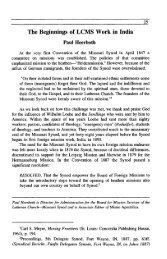The Doctrine of the New Birth From Bullinger to Edwards - Lutheran ...
The Doctrine of the New Birth From Bullinger to Edwards - Lutheran ...
The Doctrine of the New Birth From Bullinger to Edwards - Lutheran ...
Create successful ePaper yourself
Turn your PDF publications into a flip-book with our unique Google optimized e-Paper software.
102 Missio Apos<strong>to</strong>lica<strong>The</strong> <strong>Doctrine</strong> <strong>of</strong> <strong>the</strong> <strong>New</strong> <strong>Birth</strong><strong>From</strong> <strong>Bullinger</strong> <strong>to</strong> <strong>Edwards</strong>Paul R HfnlickyIntroductionIt has been famously said that "<strong>the</strong> his<strong>to</strong>ry <strong>of</strong> doctrine is its true criticism" (Straws),and in this essay I wish <strong>to</strong> syn<strong>the</strong>size <strong>the</strong> fruits <strong>of</strong> a number <strong>of</strong> his<strong>to</strong>rical scholars from aLu<strong>the</strong>ran <strong>the</strong>ological perspective <strong>to</strong> relate <strong>the</strong> s<strong>to</strong>ry <strong>of</strong> <strong>the</strong> doctrine <strong>of</strong> <strong>the</strong> <strong>New</strong> Blrth. Thisdevelopment runs chiefly from <strong>the</strong> Swiss Reformation through England <strong>to</strong> America-andfrom America's evangelical movement it has spread out <strong>to</strong> affect global Christianity. In<strong>the</strong> frst section I will sketch <strong>the</strong> his<strong>to</strong>rical development during which an amazingreversal <strong>of</strong> meaning occurred. <strong>The</strong> <strong>New</strong> <strong>Birth</strong> ceased <strong>to</strong> be unders<strong>to</strong>od as a miraculousevent bes<strong>to</strong>wed by <strong>the</strong> Spirit as He wills and came <strong>to</strong> be unders<strong>to</strong>od as a human act <strong>of</strong>self-determination. In <strong>the</strong> second section, we will shift gears from his<strong>to</strong>ry <strong>to</strong> <strong>the</strong>ology andlearn from a great American <strong>the</strong>ologian, Jonathan <strong>Edwards</strong>, who opposed this change inmeaning, even as he tried <strong>to</strong> reground <strong>the</strong> miracle <strong>of</strong> <strong>the</strong> <strong>New</strong> <strong>Birth</strong> in <strong>the</strong> his<strong>to</strong>rical event<strong>of</strong> preaching Christ. With this <strong>the</strong>ology in mind, in <strong>the</strong> conclusion we will bring <strong>the</strong>results <strong>of</strong> our study <strong>to</strong> bear both critically and constructively on <strong>the</strong> practice <strong>of</strong> baptism inLu<strong>the</strong>ran churches.It may come as a surprise both <strong>to</strong> partisans and opponents <strong>of</strong> <strong>the</strong> <strong>New</strong> <strong>Birth</strong> that thisdoctrine has a his<strong>to</strong>ry's his<strong>to</strong>ry. <strong>The</strong> study <strong>of</strong> his<strong>to</strong>ry's disillusions, and its function in<strong>the</strong>ology is largely critical. But I thmk that critical knowledge <strong>of</strong> <strong>the</strong> his<strong>to</strong>ry <strong>of</strong> <strong>the</strong> <strong>New</strong><strong>Birth</strong> cuts both ways. If it undercuts some <strong>of</strong> <strong>the</strong> pretentious claims <strong>of</strong> neo-evangelicals <strong>to</strong>have rediscovered original biblical Christianity, it no less exposes <strong>the</strong> spiritual poverty <strong>of</strong><strong>the</strong>ir usual opponents in Protestant liberalism or Lu<strong>the</strong>ran orthodoxy. We all need <strong>to</strong> beborn anew in Lu<strong>the</strong>r's sense. By this expression is not so much meant a consciousexperience <strong>of</strong> personal conversion that can be dated at <strong>the</strong> moment in which one "acceptsChrist," but ra<strong>the</strong>r a real, life-long personal transformation, namely, that we cease <strong>to</strong> livein and for ourselves and begin <strong>to</strong> live outside <strong>of</strong> ourselves in faith <strong>to</strong>wards God and inlove for our neighbor-as Lu<strong>the</strong>r described <strong>the</strong> ecstatic nature <strong>of</strong> life in <strong>the</strong> Spirit. Such apr<strong>of</strong>ound <strong>New</strong> <strong>Birth</strong> is established in sacramental baptism. It is realized every day in <strong>the</strong>life <strong>of</strong> <strong>the</strong> Christian who dies <strong>to</strong> sin and rises with Christ <strong>to</strong> newness <strong>of</strong> life. However,this new life is only completed on resurrection day, when <strong>the</strong> visio dei will hold believersrapt in praise and joy forever.Rev. Paul R. Hinlicky, Ph.D. is Pr<strong>of</strong>essor <strong>of</strong> Religion and Philosophy at RoanokeCollege, Salem, Virginia. He was Visiting Pr<strong>of</strong>essor <strong>of</strong> Systematic <strong>The</strong>ology at <strong>the</strong>Protestant <strong>The</strong>ological Faculty <strong>of</strong> Comenius University in Bratislava, Slovakia, from1993-9, and previous <strong>to</strong> that he was <strong>the</strong> pas<strong>to</strong>r <strong>of</strong> lmmanuel Lu<strong>the</strong>ran Church, Delhi, NY.
<strong>The</strong> <strong>Doctrine</strong> <strong>of</strong> <strong>the</strong> <strong>New</strong> <strong>Birth</strong> 103<strong>The</strong>se Reformation convictions are in no little tension with common emphasesamong neo-evangelicals; for example, <strong>the</strong>y hold that sacramental baptism represents afalse trust in externals, that <strong>the</strong> <strong>New</strong> <strong>Birth</strong> is a once and for all experience, that Christianexistence is not simul justus et pecca<strong>to</strong>r. Ra<strong>the</strong>r than argue directly against <strong>the</strong>seconvictions, we will tell <strong>the</strong> s<strong>to</strong>ry <strong>of</strong> <strong>the</strong> doctrine <strong>of</strong> <strong>the</strong> <strong>New</strong> <strong>Birth</strong>. Its his<strong>to</strong>ry quiteeffectively makes <strong>the</strong> argument. But it also witnesses <strong>to</strong> a Lu<strong>the</strong>ran need for <strong>the</strong> <strong>New</strong><strong>Birth</strong> and implies much that is critical about <strong>the</strong> all <strong>to</strong>o typical Lu<strong>the</strong>ran complacency,including abuses in <strong>the</strong> practice <strong>of</strong> <strong>the</strong> baptism <strong>of</strong> infants.<strong>The</strong> Puritan Background<strong>The</strong> s<strong>to</strong>ry <strong>of</strong> <strong>the</strong> doctrine <strong>of</strong> <strong>the</strong> <strong>New</strong> <strong>Birth</strong> began in England in <strong>the</strong> 17th century, at atime <strong>of</strong> considerable religious turmoil. In 1530 King Henry <strong>the</strong> VIII severed relationswith <strong>the</strong> papacy. <strong>The</strong> Church in England became <strong>the</strong> Church <strong>of</strong> England as a result, but<strong>the</strong> question <strong>of</strong> reformation in <strong>the</strong> spiritual and <strong>the</strong>ological sense was left unresolved. For<strong>the</strong> next 150 years a protracted religious and political conflict ensued, as EnglishChristianity sought <strong>to</strong> defme itself in a conflict between Roman Catholic res<strong>to</strong>rationists,Anglican nationalists, and Puritan dissidents. During a period <strong>of</strong> Roman Catholicres<strong>to</strong>ration under Queen Mary (1553-58), Protestant dissidents found shelter inSwitzerland. <strong>The</strong>re <strong>the</strong>y came under <strong>the</strong> influence <strong>of</strong> Calvin's great attempt <strong>to</strong> realize athorough reformation <strong>of</strong> Church and society according <strong>to</strong> <strong>the</strong> Word <strong>of</strong> God. Here <strong>the</strong>sedissidents also learned <strong>the</strong> new doctrine <strong>of</strong> <strong>the</strong> covenant, sometimes also called "Federal<strong>The</strong>ology," which had originated in Zurich with Zwingli's successor, Heinrich <strong>Bullinger</strong>.Originally this covenant was conceived as a justification <strong>of</strong> <strong>the</strong> baptism <strong>of</strong> childrenagainst <strong>the</strong> criticism <strong>of</strong> Anabaptists. <strong>Bullinger</strong>'s <strong>the</strong>ology appealed <strong>to</strong> <strong>the</strong> notion <strong>of</strong> <strong>the</strong>covenant as a moral contract between a gracious God and His faithful people <strong>to</strong>demonstrate that <strong>the</strong> children <strong>of</strong> believers are <strong>to</strong> be baptized, just as Jewish baby boyswere included in <strong>the</strong> covenant by circumcision. With this rationale, however, baptism <strong>of</strong>an infant ceased <strong>to</strong> be unders<strong>to</strong>od as a sacramental act in which God adopts <strong>the</strong> child.Ra<strong>the</strong>r it came <strong>to</strong> be unders<strong>to</strong>od as a mutually obligating pact. Baptism <strong>of</strong> infantsbecomes a covenant-making act in which <strong>the</strong> parents undertake <strong>the</strong> obligation <strong>to</strong> raise <strong>the</strong>child in <strong>the</strong> knowledge <strong>of</strong> God, and God is obligated in time <strong>to</strong> bes<strong>to</strong>w <strong>the</strong> miracle <strong>of</strong><strong>New</strong> <strong>Birth</strong> upon it.Returning <strong>to</strong> England under <strong>the</strong> reign <strong>of</strong> Queen Elizabeth, <strong>the</strong>se Christians nowagitated for reformation <strong>of</strong> church and society in <strong>the</strong> Calvinist sense. As a result <strong>the</strong>ycame in<strong>to</strong> increasing conflict with <strong>the</strong> Anglican state-church establishment. <strong>The</strong> term,Puritan, came in<strong>to</strong> existence as an Anglican insult. It referred derisively <strong>to</strong> those whounder<strong>to</strong>ok <strong>to</strong> "purify" <strong>the</strong> Church <strong>of</strong> England. <strong>The</strong> Puritans, however, welcomed <strong>the</strong>name and made it in<strong>to</strong> a byword, even as <strong>the</strong>y became increasingly radicalized.' More' "Puritanism in [a] generic sense is 'st~ictness <strong>of</strong> living and simplicity <strong>of</strong> worship'-Christianity in its pristlnepurity, and opposed <strong>to</strong> fleshly and worldly compromise, as well as <strong>to</strong> ecclesiasticrsm, ritualism, <strong>the</strong>multipl~cation <strong>of</strong> sacramental mysteries, and <strong>the</strong> elaboration <strong>of</strong> dogma. [This] is a recurrent phenomenon inChristianity." Ralph Bar<strong>to</strong>n Perry, Puritanism and Democracy (Vanguard, 1944) 66.
104 Missio Apos<strong>to</strong>licaand more <strong>the</strong>y viewed <strong>the</strong> established Church <strong>of</strong> England as mired in papistical errors:composed <strong>of</strong> a false membership, including nominal Christians who had not actuallyexpenenced rebirth; maintaming a false ministry <strong>of</strong> Episcopal clericahsm inherited from<strong>the</strong> hated Roman Catholic past; <strong>of</strong>fering false worship <strong>of</strong> a liturgical type mandated in <strong>the</strong>"Book <strong>of</strong> Common Prayer"; yoked <strong>to</strong> <strong>the</strong> crown, far <strong>to</strong>o little inspired by <strong>the</strong> Spint <strong>of</strong>Christ at work m His reborn pe~ple.~ A critique so rahcal could hardly be <strong>to</strong>lerated, andm time <strong>the</strong> Puritans were harassed and persecuted by <strong>the</strong> Anglican establishment.<strong>The</strong> &tans <strong>of</strong> 17' century England, in <strong>the</strong> words <strong>of</strong> one <strong>the</strong>ir writers, wanted a"reformahon without tarrying for any"-reform now! That demand led <strong>the</strong>m <strong>to</strong>imrmgrate <strong>to</strong> Amenca. <strong>The</strong>y could settle in America without <strong>of</strong>ficially separating from<strong>the</strong> Church <strong>of</strong> England, holdmg out hope for its eventual reformation. In <strong>the</strong> freedom <strong>of</strong><strong>the</strong> new world, however, <strong>the</strong>y would be able <strong>to</strong> live accordmg <strong>to</strong> <strong>the</strong>ir own convictions,establishing a church and soclety governed by <strong>the</strong> Word <strong>of</strong> God. <strong>The</strong>ir reformationwould mean, as William Bradford, <strong>the</strong> first Puntan governor <strong>of</strong> Massachusetts wrote inhis account Of Plymouth Plantation, that ?he churches <strong>of</strong> God revert <strong>to</strong> <strong>the</strong>ir ancientpurity; and recover <strong>the</strong>ir prirmtive order, liberty and beauty." <strong>The</strong> doctrine <strong>of</strong> <strong>the</strong> <strong>New</strong><strong>Birth</strong> which <strong>the</strong>y developed coheres with this desire <strong>to</strong> be freed <strong>of</strong> human traditions andpunfled <strong>of</strong> <strong>the</strong> entanglements <strong>of</strong> his<strong>to</strong>ry, <strong>to</strong> return <strong>to</strong> <strong>the</strong> golden past and re-establishchurch and society on <strong>the</strong> basis <strong>of</strong> <strong>the</strong> original revelation <strong>of</strong> <strong>the</strong> will <strong>of</strong> God. <strong>The</strong>se fustAmericans believed that <strong>the</strong>y ''were new in that <strong>the</strong>y had been cut loose from <strong>the</strong>constTaints <strong>of</strong> his<strong>to</strong>ry and time and s<strong>to</strong>od on <strong>the</strong> threshold <strong>of</strong> a radically new age whichwas wholly discontinuous with all previous epochs.") So a <strong>New</strong> <strong>Birth</strong> was envisioned fora new life in <strong>the</strong> new world!For most <strong>of</strong> Christian h<strong>to</strong>ry, <strong>the</strong> several biblical allus<strong>to</strong>ns <strong>to</strong> <strong>the</strong> <strong>New</strong> <strong>Birth</strong> weretaken <strong>to</strong> refer <strong>to</strong> <strong>the</strong> new status in <strong>the</strong> eyes <strong>of</strong> God <strong>to</strong> which believers attained at <strong>the</strong>nbaptism, since baptism unites <strong>the</strong>m with Christ and so makes <strong>the</strong>m children <strong>of</strong> <strong>the</strong> sameheavenly Fa<strong>the</strong>r. <strong>New</strong> <strong>Birth</strong> referred <strong>to</strong> baptismal adoption, and <strong>to</strong> <strong>the</strong> person's objectivestatus before God, whe<strong>the</strong>r or not he or she was conscious <strong>of</strong> it. This is cedy howLu<strong>the</strong>r unders<strong>to</strong>od things, as is clear in his sharply worded essay, ConcerningRebapt~rn.~ But for <strong>the</strong> Puritans <strong>New</strong> <strong>Birth</strong> referred primarily <strong>to</strong> <strong>the</strong> miraculoustransformation <strong>of</strong> <strong>the</strong> human heart, which God <strong>the</strong> Spirit graciously bes<strong>to</strong>wed in armraculous, sovereign visitation. Thus according <strong>to</strong> <strong>Bullinger</strong>, and <strong>the</strong> Puritans who fellunder hrs mfluence, <strong>the</strong> reformation doctrine <strong>of</strong> justification by faith was unders<strong>to</strong>od in away quite distinct from Lu<strong>the</strong>r, or even Calvin. <strong>The</strong> covenant <strong>of</strong> grace was free, <strong>the</strong>ysaid, but not without conditions. A covenant is by definition conditioned; it obligates allparties involved and defines <strong>the</strong>ir relationships. <strong>The</strong> grace <strong>of</strong> <strong>New</strong> <strong>Birth</strong> is mediatedthrough a conditional covenant in which God for Christ's sake pledges <strong>to</strong> be merciful,and <strong>the</strong> believer in exchange pledges <strong>to</strong> love God and neighbor. "<strong>Bullinger</strong> disagreedwith Lu<strong>the</strong>r on law and gospel ... His entire <strong>the</strong>ological system was organized around <strong>the</strong>2John Von Rohr, j3re Shaping <strong>of</strong>American Congregatiodism: 1620-1957 (Pilgrim, 1992) 1 1.'Rchard T. Hughes and C. Leonard Allen, Illusions <strong>of</strong>lnnocence: Protestant Primitivism in America, 1630-1875 (University <strong>of</strong> Chicago, 1988) 1 .Lu<strong>the</strong>r, Concerning Rebaptism
<strong>The</strong> <strong>Doctrine</strong> <strong>of</strong> <strong>the</strong> <strong>New</strong> <strong>Birth</strong> 105idea <strong>of</strong> a bilateral, conditional covenant, made first by God with Adam, a covenant thatwould endure until <strong>the</strong> end <strong>of</strong> <strong>the</strong> ~orld."~Spiritual certainty inevitably becomes <strong>the</strong> predominant concern when one's relation<strong>to</strong> God is made <strong>to</strong> depend on fulfilling certain conditions. This concern cannot besatisfied with Lu<strong>the</strong>r's counsel, "I am baptized!" which holds on<strong>to</strong> <strong>the</strong> objectivity <strong>of</strong> <strong>the</strong>Word and Sacraments, nor can it be content with Calvin's gratui<strong>to</strong>us, Spirit-givenconv~ction <strong>of</strong> God's election. According <strong>to</strong> covenant <strong>the</strong>ology, one does his or her partby fulfilling <strong>the</strong> covenantal obligations. This may or may not lead <strong>to</strong> <strong>the</strong> experience inone's self <strong>of</strong> <strong>the</strong> birth <strong>of</strong> new, holy desires <strong>of</strong> love for God and neighbor. Spiritualcertainty finally comes about only with this miraculous, life-changing event in one'sinterior life. So one can, by introspection, look and see whe<strong>the</strong>r that new love for God ispresent in one's heart. One can detect <strong>the</strong> evidences <strong>of</strong> sanctification. Lacking that, onecan prepare one's self and work <strong>to</strong>ward attaining <strong>the</strong> precious experjence <strong>of</strong> rebirth. Onecan conform one's self <strong>to</strong> <strong>the</strong> conditions <strong>of</strong> <strong>the</strong> covenant. Thus <strong>the</strong> process <strong>of</strong> salvationfollows a definite pattern, climaxing in a personal, datable experience <strong>of</strong> regeneration.Human beings cannot save <strong>the</strong>mselves. God must save <strong>the</strong>m. This occurs in <strong>the</strong>supernatural work <strong>of</strong> reblrth. If we prepare ourselves, however, if we conform <strong>to</strong> <strong>the</strong>conditions <strong>of</strong> <strong>the</strong> covenant, God will surely work our rebirth. "God helps those who help<strong>the</strong>mselves."This scheme in many respects sounds llke a return <strong>to</strong> <strong>the</strong> pre-Reformationperspective <strong>of</strong> "works righteousness" (<strong>the</strong> facere quod in se <strong>of</strong> late Nominalism and itsdistinction between God's absolute power <strong>to</strong> do whatever He wishes and God's orderedpower by which He has bound Himself <strong>to</strong> covenants with man). So it sounds because it isa return <strong>to</strong> "<strong>the</strong> program <strong>of</strong> medieval monks and nuns," according <strong>to</strong> E. Glenn Hinson'sconvincing study <strong>of</strong> Puritan ~~irituality.~ In many ways, Puritanism is a Protestantversion <strong>of</strong> monastic asceticism, focused intently on a rigorous process <strong>of</strong> personaltransfomat~on. It is Protestant in that it replaces <strong>the</strong> Sacrament <strong>of</strong> baptism as <strong>the</strong> basis <strong>of</strong>this effort at personal transformation with <strong>the</strong> free event <strong>of</strong> <strong>the</strong> <strong>New</strong> <strong>Birth</strong>, but <strong>the</strong> basicscheme is more similar <strong>to</strong> than different from <strong>the</strong> monastic quest for self-transformationthrough spiritual exercises and pious works.<strong>The</strong> Puritan <strong>Doctrine</strong> <strong>of</strong> <strong>the</strong> <strong>New</strong> <strong>Birth</strong>It is in this context that we have <strong>to</strong> understand <strong>the</strong>ir doctrine <strong>of</strong> <strong>the</strong> <strong>New</strong> <strong>Birth</strong>.Distrust in human authority, whe<strong>the</strong>r in Church or State, and distrust in <strong>the</strong> mediation <strong>of</strong>God's Word and saving grace through external means, were <strong>the</strong> occasion for <strong>the</strong>formation <strong>of</strong> <strong>the</strong> Puritan's positive convictions. Sacraments and even sermons were notmeans <strong>of</strong> grace but outward signs, seals or testimonies <strong>to</strong> an independent, inner,supernatural work <strong>of</strong> <strong>the</strong> Spirit. It was this inner work <strong>of</strong> <strong>the</strong> Spirit which really counted:'Charles S. McCoy and J. Wayne Baker, FouniainheadoJFederalism: Heinrich BuNinger and <strong>the</strong> CovenantalTradirion (Westminster, 1991) 11 -1 3, cf 52; 24-26.6Pr~te~fant Spiritunl Traditions ed. Frank C. Senn (Paulist Press, 1986) 172
106 Missio Apos<strong>to</strong>lica<strong>the</strong> coming <strong>of</strong> <strong>the</strong> Spirit, who pours <strong>the</strong> love <strong>of</strong> God in<strong>to</strong> a person's heart, producing <strong>the</strong>newly born soul. Everything depended on this experience <strong>of</strong> <strong>New</strong> <strong>Birth</strong>. Only suchpersons were actually Christians. Only such persons who could credibly tell <strong>the</strong> s<strong>to</strong>ry <strong>of</strong><strong>the</strong>ir regeneration were <strong>to</strong> be admitted <strong>to</strong> <strong>the</strong> fellowship <strong>of</strong> <strong>the</strong> Church. In turn, <strong>the</strong>Church would not be, as in Lu<strong>the</strong>r's <strong>the</strong>ology, <strong>the</strong> assembly ga<strong>the</strong>red around Word andSacrament, but ra<strong>the</strong>r a purified fellowship <strong>of</strong> <strong>the</strong> regenerate. In a godly order, moreover,in a Church and society governed by <strong>the</strong> Word <strong>of</strong> God, secular governance <strong>to</strong>o would fall<strong>to</strong> <strong>the</strong> regenerate, who would take up <strong>the</strong> civil sword <strong>to</strong> enforce obedience <strong>to</strong> both tables<strong>of</strong> <strong>the</strong> law.In all <strong>the</strong> foregoing we note <strong>the</strong> general Reformed suspicion <strong>of</strong> 'reliance on materialsymbols,' or 'trust in externals' as opposed <strong>to</strong> inner change. <strong>The</strong>re was a deliberatedistancing from <strong>the</strong> Church <strong>of</strong> England that had recognized sacraments as <strong>the</strong> 'cementingbond.' For <strong>the</strong> Puritans <strong>the</strong> only 'cementing bond' was <strong>the</strong> covenant which one ownedthrough a public attestation <strong>of</strong> one's regeneration. <strong>The</strong> covenant,' not <strong>the</strong> Sacrament,revealed and communicated God's will and salvation. As in all Reformed Christianity,<strong>the</strong>re was <strong>the</strong> influence <strong>of</strong> <strong>the</strong> Calvinist doctrine <strong>of</strong> predestination, which implied <strong>the</strong>ultimate irrelevance <strong>of</strong> his<strong>to</strong>rical circumstance vis-a-vis God's eternal decree. God'sregal act <strong>of</strong> election in sending his Spirit and conferring <strong>the</strong> <strong>New</strong> <strong>Birth</strong> could occur quiteapart from <strong>the</strong> ministrations <strong>of</strong> <strong>the</strong> Church. On <strong>the</strong> o<strong>the</strong>r hand <strong>the</strong> more rationalistic andhumanistic influences <strong>of</strong> Zwingli and <strong>Bullinger</strong> implied that God subjected himself <strong>to</strong>covenants out <strong>of</strong> mercy for humanity, and would surely give his Spirit <strong>to</strong> those whosought it.Admission <strong>to</strong> <strong>the</strong> Lord's Supper was sharply restricted. As a "meal for <strong>the</strong> holyra<strong>the</strong>r than a meal <strong>to</strong> produce holiness," only those publicly certified as regenerate couldreceive. This was only a fraction <strong>of</strong> those in attendance on Sundays.' Thus for <strong>the</strong>Puritans a reformed Church was a purified Church. A congregation came in<strong>to</strong> being as,and only as, a "ga<strong>the</strong>ring" <strong>of</strong> such who are regenerate. John Cot<strong>to</strong>n (1584-1652), a<strong>to</strong>wering figure in early <strong>New</strong> England, was <strong>the</strong> great <strong>the</strong>oretician <strong>of</strong> this rigorousecclesiology. In express opposition <strong>to</strong> all "'human invention' still honored in <strong>the</strong> Church<strong>of</strong> England," Cot<strong>to</strong>n rigorously reasoned an ecclesiology "bound by biblical precedent:nothing was <strong>to</strong> be done but 'that which you have <strong>the</strong> express warrant <strong>of</strong> God's Wordfor."' All ceremonial pomp and circumstance must be swept out as so many distractions!<strong>The</strong> task <strong>of</strong> preaching was singular and central in such an ecclesiology: "opening <strong>the</strong>doctrine <strong>of</strong> salvation <strong>to</strong> <strong>the</strong> sinner and articulating, as an instrument <strong>of</strong> <strong>the</strong> Holy Spirit,<strong>the</strong> experience <strong>of</strong> grace so that <strong>the</strong> elect might be settled and joyous in <strong>the</strong>ir estate."' <strong>The</strong>Puritan preacher was <strong>to</strong> lead his hearers step by step through <strong>the</strong> process <strong>of</strong> salvation,culminating in <strong>the</strong> saving event <strong>of</strong> <strong>the</strong> <strong>New</strong> <strong>Birth</strong>.Attaining <strong>the</strong> <strong>New</strong> <strong>Birth</strong> was no stroll through <strong>the</strong> park. Puritan <strong>the</strong>ologian WilliamPerkins outlined <strong>the</strong> order <strong>of</strong> salvation in no less than ten steps: beginning with some"cross" that exposed <strong>the</strong> "self s insufficiency," and led <strong>to</strong> awareness <strong>of</strong> "<strong>the</strong> rigor <strong>of</strong>'Von Rohr, 102-8.Hughes &Allen, 25-52; Mark A. Noll, A His<strong>to</strong>ry <strong>of</strong> Christianity in <strong>the</strong> Uniled States and Canada (Eerdmans,1992) 46. Also Cotlon Ma<strong>the</strong>r Selections ed. Kenneth B. Murdock (Harcourt, Brace & Co., 1926) 76
<strong>The</strong> <strong>Doctrine</strong> <strong>of</strong> <strong>the</strong> <strong>New</strong> <strong>Birth</strong> 107God's demand." Faced with God's demand, one discovered in oneself <strong>the</strong> resisting"power <strong>of</strong> sin," and so experienced <strong>the</strong> "fear <strong>of</strong> damnation." Thus far, according <strong>to</strong>Perkins, we have only "works <strong>of</strong> preparation." To proceed in <strong>the</strong> pilgrimage <strong>to</strong> God aspecial gift <strong>of</strong> grace is now required. For <strong>the</strong> next step is "a serious contemplation <strong>of</strong> <strong>the</strong>promise <strong>of</strong> salvation." This produces <strong>the</strong> "first sparks <strong>of</strong> faith." But our pilgrim is farfrom safely arrived. Now <strong>the</strong> devil attacks! <strong>The</strong> little seed <strong>of</strong> faith is overwhelmed in a"travail <strong>of</strong> doubt and despair"; <strong>to</strong> survive at all, it must press through <strong>to</strong> a full sense <strong>of</strong>personal assurance. <strong>The</strong> f ~st sign <strong>of</strong> such assurance is a period <strong>of</strong> "evangelical sorrow inwhich sin becomes grievous <strong>to</strong> <strong>the</strong> saintly person purely because it is sin." At last, Godcrowns <strong>the</strong> struggle "with <strong>the</strong> grace <strong>of</strong> heartfelt, voluntary, joyful obedience": a newspirit for <strong>the</strong> living <strong>of</strong> <strong>the</strong> lifelong walk <strong>of</strong> sanctifi~ation.~<strong>The</strong> living wellspring <strong>of</strong> <strong>the</strong> whole <strong>New</strong> England order was <strong>the</strong> continuing miracle <strong>of</strong>personal regeneration. God gave <strong>the</strong> <strong>New</strong> <strong>Birth</strong>, and <strong>the</strong> newly born soul qualified forChurch membership with a public attestation. <strong>The</strong>se new Church niembers received <strong>the</strong>franchise, <strong>the</strong> political right, <strong>to</strong> participate in public affairs. But what if <strong>the</strong>re were a hugedrought? What if <strong>the</strong> wellspring <strong>of</strong> regeneration went dry? What if <strong>the</strong> spiritual fires <strong>of</strong><strong>the</strong> fa<strong>the</strong>rs failed <strong>to</strong> rekindle in <strong>the</strong> souls <strong>of</strong> <strong>the</strong>ir chldren? In fact, that is what happenedin <strong>New</strong> England. In <strong>the</strong> second and third generation, increasing numbers failed "<strong>to</strong> findconscientiously within <strong>the</strong>mselves that which was most required, <strong>the</strong> personal lifechangingreligious e~~erience."'~ "<strong>The</strong> Puritan dilemma was delicate: leaders wished <strong>to</strong>preserve <strong>the</strong> church for genuine believers but <strong>the</strong>y also wanted <strong>to</strong> keep as many people aspossible under <strong>the</strong> influence <strong>of</strong> <strong>the</strong> church. <strong>The</strong>ir solution was <strong>to</strong> propose a "halfwaycovenant"" This "half-way covenant" meant that <strong>the</strong> right <strong>to</strong> have children baptizedwould be extended <strong>to</strong> those adults who would pr<strong>of</strong>ess <strong>the</strong> faith, even if <strong>the</strong>y could notnarrate a personal conversion experience. <strong>The</strong>se were still barred from full membershipand participat~on in <strong>the</strong> Lord's Supper. In <strong>the</strong> meantime, moreover, <strong>the</strong> economic anddemographic growth <strong>of</strong> <strong>the</strong> <strong>New</strong> England colony simply overwhelmed <strong>the</strong> restriction <strong>of</strong><strong>the</strong> franchise <strong>to</strong> <strong>the</strong> regenerate; <strong>the</strong>re were <strong>to</strong>o few reborn <strong>to</strong> handle all <strong>the</strong> affairs <strong>of</strong> state!At this juncture, American Christianity, dominated by <strong>the</strong> leading ideas <strong>of</strong>Puritanism, faced a pr<strong>of</strong>ound dilemma. By 1701 Cot<strong>to</strong>n Ma<strong>the</strong>r had <strong>to</strong> concede "agloomy vision <strong>of</strong> need among his own fallen-away people." Martin Marty also callsattention <strong>to</strong> Ma<strong>the</strong>r's lament over <strong>the</strong> loss <strong>of</strong> spiritual and doctrinal uniformity:"[Ma<strong>the</strong>r] mourned <strong>the</strong> fact that <strong>the</strong> American Jerusalem in <strong>the</strong> wilderness wasno longer pure, but had <strong>to</strong> include-and he named <strong>the</strong>m all-antinomians, familists,Brownlsts, Separatists, old-style Quakers, Pelagians, Arminians and <strong>the</strong> RomanPapists "whose religion is anti-Christian," and whose errors came from <strong>the</strong> devil <strong>of</strong>hell. [Marty comments:] It was clearly time for true Protestantism <strong>to</strong> assert it~elf."'~E. Brooks Hollfield, A His<strong>to</strong>ry <strong>of</strong> Pas<strong>to</strong>ral Care in America: <strong>From</strong> Salvation <strong>to</strong> Self-Realization (Abingdon,1983) 27.''Von Rohr, 119." No11,48.l2 Martin E. Marty, Pilgnms in <strong>The</strong>ir Own Land: 500 Years <strong>of</strong> Religion in America (Little, Brown & Co.,I9841109 10.
108 Missio Apos<strong>to</strong>licaCompounding <strong>the</strong> problems <strong>of</strong> pluralism and dissension was <strong>the</strong> loss <strong>of</strong> <strong>the</strong> firstgeneration's fervor. Apathy led <strong>to</strong> neglect <strong>of</strong> mission, Cot<strong>to</strong>n complained, both <strong>to</strong> <strong>the</strong>Native Americans and Black African slaves. Likewise <strong>the</strong> "common people [were]neglected by <strong>the</strong> established ch~rches."'~ Behind such concerns about <strong>the</strong> loss <strong>of</strong> Puntaninfluence s<strong>to</strong>od <strong>the</strong> specter <strong>of</strong> an expandmg Catholicism. To <strong>the</strong> north lay <strong>New</strong> France,which was penetrating southward, a papal outpost m <strong>the</strong> would-be "Protestant empire"(Marty). None<strong>the</strong>less, <strong>the</strong> most pr<strong>of</strong>ound challenge came &om within, with <strong>the</strong> rapidcommercial success <strong>of</strong> <strong>the</strong> colonies and <strong>the</strong> rise <strong>of</strong> <strong>the</strong> urban market place, i.e. a "morallyneutral arena <strong>of</strong> goods exchanged and sentices governed by impersonal rules <strong>of</strong> supplyand demand."" Economic success and commercial prosperity were makmg worldlings <strong>of</strong><strong>the</strong> second and third generation Puritans. Thus bands <strong>of</strong> legally coerced religiousuniformity were unravehg; <strong>the</strong> hearts and minds <strong>of</strong> <strong>the</strong> younger generation were beinglost <strong>to</strong> worldly concerns; dissent and <strong>the</strong> sheer diversity <strong>of</strong> <strong>the</strong> sects made all religiousclaims suspect. What was <strong>to</strong> be done? Ralph Bar<strong>to</strong>n Perry articulates <strong>the</strong> dilemma: "<strong>The</strong>rise <strong>of</strong> apathy and dissension brought <strong>the</strong> Puritan <strong>the</strong>ocracy <strong>to</strong> a parting <strong>of</strong> <strong>the</strong> ways. Twoalternatives presented <strong>the</strong>mselves: revival <strong>of</strong> flagging zeal and <strong>the</strong> re-conquest <strong>of</strong> dissent,or ... <strong>the</strong> separation <strong>of</strong> church and state. <strong>The</strong> former was <strong>the</strong> way <strong>the</strong> "new light" Puritans<strong>to</strong>ok, <strong>the</strong> latter <strong>the</strong> way <strong>of</strong> <strong>the</strong>ir secularized step-bro<strong>the</strong>rs and sisters, <strong>the</strong> Democrats.Revivalism was born as a strategy for "<strong>the</strong>ocratic rein~igoration."'~<strong>The</strong> Great Awakening<strong>The</strong> First Great Awakening, as it is known, was an extended series <strong>of</strong> local revivalsin <strong>the</strong> 1730s and 40s that swept all <strong>the</strong> English colonies along <strong>the</strong> Atlantic coast. In <strong>the</strong>aforementioned climate <strong>of</strong> demoralization and loss <strong>of</strong> influence in <strong>the</strong> original churches,<strong>the</strong> Awakening began with a provocative assault on settled churches and <strong>the</strong>ir establishedmmistries. <strong>The</strong>odore J. Frelmghuysen, a Dutch Reformed preacher in <strong>New</strong> Jersey,assailed his new congregation in 1720 in a sermon that preceded a cus<strong>to</strong>mary celebration<strong>of</strong> <strong>the</strong> Lord's Supper:"Much-loved hearers, who have so <strong>of</strong>ten been at <strong>the</strong> Lord's table, do you knowthat <strong>the</strong> unconverted may not approach? Have you <strong>the</strong>n, with <strong>the</strong> utmost careexamined, whe<strong>the</strong>r you be born again? ... whe<strong>the</strong>r you were <strong>of</strong> ;he number <strong>of</strong> thosewho are invited? ... Remember that though morally and outwardly religious, if youstill be unregenerate and destitute <strong>of</strong> spiritual life, you have no warrant for anapproach <strong>to</strong> <strong>the</strong> table <strong>of</strong> grace."16Among <strong>the</strong> Presbyterians, William Tennant directed correspondingly fierce critique atrnmisters, savagely satxizing <strong>the</strong>ir spiritual compIacency and lifting up <strong>to</strong> public ridiculeI' Noll. 91l4 ~ar& S. S<strong>to</strong>ut, <strong>The</strong> Divine Drarnarisr: George Whitejield and <strong>the</strong> Rise <strong>of</strong> Modern Evangelicalism (Eerdmans,1991)34"~ej, 343.I6Cited in Robert C. Whittemore, Makers <strong>of</strong> <strong>the</strong> American Mind: Three Centuries <strong>of</strong> American Though1 andThinkers (William Morrow & Co , 1964) 25-6.
<strong>The</strong> <strong>Doctrine</strong> <strong>of</strong> <strong>the</strong> <strong>New</strong> <strong>Birth</strong> 109<strong>the</strong> "danger <strong>of</strong> an unconverted mini~try.'"~ Tennant "urged followers <strong>to</strong> leave <strong>the</strong>irchurches if <strong>the</strong>y were not organized around <strong>the</strong> experience <strong>of</strong> <strong>the</strong> <strong>New</strong> <strong>Birth</strong>.'"' <strong>The</strong>sespmtuaIiy dead preachers were incapable <strong>of</strong> rousing <strong>the</strong>ir flocks <strong>to</strong> repentance. Fear <strong>of</strong>eternal loss <strong>of</strong> God and punishment had <strong>to</strong> be preached; despair <strong>of</strong> self was prerequisite<strong>to</strong> <strong>the</strong> <strong>New</strong> Brrth. Grace could not be taken for granted, ei<strong>the</strong>r by reliance on <strong>the</strong> outwardrites <strong>of</strong> relgion or by a moraI conformity <strong>to</strong> <strong>the</strong> conditions <strong>of</strong> <strong>the</strong> covenant. <strong>The</strong> truth wasthat nothing less than <strong>the</strong> <strong>New</strong> <strong>Birth</strong> gained one's entrance <strong>to</strong> <strong>the</strong> Kingdom <strong>of</strong> God. <strong>The</strong>settied churches and <strong>the</strong> established ministers, w~th <strong>the</strong>ir "Half-Way Covenant"compromise, had lost sight <strong>of</strong> that fact.Leading <strong>the</strong> revival was <strong>the</strong> Englishman George Whitefield, America's fnst greatnational evangelist, who in <strong>the</strong> course <strong>of</strong> his long career made thirteen preaching <strong>to</strong>urs <strong>of</strong><strong>the</strong> colonies. Whitefield's impact was spectacular, ga<strong>the</strong>ring, for example, a phenomenalcrowd in Philadelphia that even <strong>the</strong> skeptical observer Benjamin Franklin estimated atsome 30,000 people. WtefieId vmlly engineered <strong>the</strong> First Great Awakening with abrand new style <strong>of</strong> public ministry and an aggressive, two-fisted message <strong>of</strong> (1) <strong>the</strong>necessity and possibdity <strong>of</strong> <strong>the</strong> <strong>New</strong> <strong>Birth</strong> and (2) <strong>the</strong> attack on <strong>the</strong> established churchesw~th <strong>the</strong>ir spiritually dead ministry. Whitefield once said that <strong>the</strong> Archbishop <strong>of</strong>Canterbury knew "no more <strong>of</strong> saving grace than Mah~met"'~ In a Bos<strong>to</strong>n pulpit, hecompared <strong>the</strong> majority <strong>of</strong> <strong>the</strong> clergy <strong>to</strong> uncomprehendmg Nicodemus and relayed "Jesus'stem injuncbon ... <strong>to</strong> be born again." "I am persuaded <strong>the</strong> generality <strong>of</strong> preachers talk <strong>of</strong>an unknown and unfelt Chst. <strong>The</strong> reason why congregations have been so dead isbecause <strong>the</strong>y have dead men preaching <strong>to</strong> <strong>the</strong>m ... How can dead men beget living~hildren?"~Whitefield's preaching was animated by h~s own deeply-felt spiritual rebirth. Withgreat em<strong>of</strong>ional energy, Whrtefield dramatically portrayed on <strong>the</strong> open stage <strong>of</strong> hs publicpulpit <strong>the</strong> journey <strong>to</strong> <strong>the</strong> <strong>New</strong> <strong>Birth</strong>. Unlike <strong>the</strong> arid doctrinal sermons <strong>of</strong> <strong>the</strong> establishedpattern2* Whitefield acted out <strong>the</strong> great s<strong>to</strong>ries <strong>of</strong> <strong>the</strong> Bible, as it were, inviting his hearers<strong>to</strong> enter <strong>the</strong> spiritual world thus depicted. Despite <strong>the</strong> fact that Whitefield consideredhrmself a strict Calvinist and upheld <strong>the</strong> sole causality <strong>of</strong> God in salvation, his wholestyle <strong>of</strong> ministry brought relig~on out <strong>of</strong> <strong>the</strong> churches and in<strong>to</strong> <strong>the</strong> marketplace, a process""If <strong>the</strong>y can get one that has <strong>the</strong> Name <strong>of</strong> a Minister, with a Band and black coat or gown <strong>to</strong> carry on aSabbath-days among <strong>the</strong>m, although never so coldly and unsuccessfulty; if he is free f m gmss crimes inpractice and takes good care <strong>to</strong> keep at a due distance from <strong>the</strong>ir consciences ...I <strong>the</strong>n <strong>the</strong>y have] a prudent.charitable man. He is not always harping upon terror and sounding damnation in our ears, like some rashheaded preachers who by <strong>the</strong>ir uncharitable methods are ready <strong>to</strong> put poor people out <strong>of</strong> <strong>the</strong>ir wits w run <strong>the</strong>min<strong>to</strong> despair. O! how terrible a thing is that despair! Ay, our minister, honest man, gives us good caution againstir" Ibid. 28." hid., 101.l9 Ibid 131.lo Consider <strong>the</strong> preaching, presumably typical, which Benjamin Franklin reports hearing. "Had he been in myopinion a good preacher perhaps I might have continued, but his discourses were chiefly ei<strong>the</strong>r polmicarguments, or explications <strong>of</strong> <strong>the</strong> pculiar doctrines <strong>of</strong> our sect, and were all <strong>to</strong> me very dry, uninteresting andunedifying, since not a single moral principle was inculcated or enforced, <strong>the</strong>ir aim seeming <strong>to</strong> be ra<strong>the</strong>r <strong>to</strong>nmke us Presbyterians than good citizens." 7he Au<strong>to</strong>biography <strong>of</strong>Benjamin Franklin (Walter J. Btack, 1941)126-7.
1 10 Missio Apos<strong>to</strong>licathat inevitably subverted his Calvinist <strong>the</strong>ology. S<strong>to</strong>ut has written very perceptively aboutthis:"It was only a matter <strong>of</strong> time before religion was marketed alongside ... o<strong>the</strong>rcultural endeavors ... In economic terms, religion increasingly represented a productthat could be marketed. In turn, <strong>the</strong> public supported its marketeers, <strong>to</strong>ge<strong>the</strong>r with<strong>the</strong> charitable and religious causes <strong>the</strong>y championed, liberated from past patriarchalrelations and freely responsible for making <strong>the</strong>lr own choice. This process <strong>of</strong>commercialization necessarily transformed concepts <strong>of</strong> religion and relig~ousexperience generally: <strong>the</strong>y came <strong>to</strong> be viewed in much more individualistic andsubject~ve terms. "Experience," "taste," and "attraction" became sufficient criteriafor purchase. ... In <strong>the</strong> new revival, religion was becoming less a matter <strong>of</strong> familybirthright or communal habit than an arena <strong>of</strong> choice based on personal preferenceand individual e~perience."~'Martin Marty llkewise notes:"... thanks <strong>to</strong> <strong>the</strong> new styles <strong>of</strong> <strong>the</strong> Awaken~ng period, religion itself becamemore than ever before a matter <strong>of</strong> choice. Some see this increase <strong>of</strong> choice as <strong>the</strong>essence <strong>of</strong> modem fa~th. ... At [<strong>the</strong> heart <strong>of</strong> <strong>the</strong> Awakening] was <strong>the</strong> notion <strong>of</strong>cho~ce: you must choose Jesus Christ, must decide <strong>to</strong> let <strong>the</strong> Spirit <strong>of</strong> God work inyour heart and-note well!-you may and must choose this version <strong>of</strong> Christianityagainst lhat ~ersion!"~'With this controversial and popular irreverence <strong>to</strong>ward traditional versions <strong>of</strong> religiousauthority, Whitefield and <strong>the</strong> First Great Awakening made a revolutionary appeal <strong>to</strong>human experience. Spuitual certainty could be had, <strong>the</strong>y claimed, through <strong>the</strong>biographical event <strong>of</strong> spiritual self-determination. In this sense, George Whitefieldpreached nothing but <strong>the</strong> doctrine <strong>of</strong> <strong>the</strong> <strong>New</strong> <strong>Birth</strong>. Whitefield remarked about one <strong>of</strong>his early revivals, "<strong>The</strong> doctrine <strong>of</strong> <strong>the</strong> new birth ... made its way llke lightning in<strong>to</strong> <strong>the</strong>hearers' conscience^."^^ S<strong>to</strong>ut gives us an excellent picture <strong>of</strong> it:<strong>The</strong> all-consuming <strong>the</strong>me <strong>of</strong> <strong>the</strong> <strong>New</strong> <strong>Birth</strong> ... was featured in one way orano<strong>the</strong>r in virtually every sermon [Whitefield] preached. ... [According <strong>to</strong> <strong>the</strong> oldPuritans,] after <strong>the</strong> <strong>New</strong> <strong>Birth</strong> [sinners] <strong>to</strong>ok on <strong>the</strong> mantle <strong>of</strong> Christ and becameinGod's eyes-new creatures. Left unspecified in Puritan sermons was whe<strong>the</strong>r and<strong>to</strong> what extent <strong>the</strong> new creatures became new in <strong>the</strong>ir own eyes. ... In Whitefield'ssermon[s], <strong>the</strong> personal experience [<strong>of</strong> such newness] was immediate andoverwhelming. He preached as though <strong>the</strong>re might be no <strong>to</strong>morrow, <strong>to</strong> an audiencewho might never again assemble in <strong>the</strong> present configuration. Throughout, heshowed no interest in <strong>the</strong>ology. Instead <strong>of</strong> doctrine, he explored <strong>the</strong> feelings <strong>of</strong> <strong>the</strong><strong>New</strong> <strong>Birth</strong> and through his exploration invited hearers <strong>to</strong> experience it for<strong>the</strong>mselves. ... Repeatedly he asked his listeners <strong>to</strong> imagine a different state <strong>of</strong>'' S<strong>to</strong>ut, 36, 102.j2 tvlarty, 108-9." S<strong>to</strong>ut, 37.
<strong>The</strong> <strong>Doctrine</strong> <strong>of</strong> <strong>the</strong> <strong>New</strong> <strong>Birth</strong> 11 1being, <strong>to</strong> lmaglne being bir<strong>the</strong>d in<strong>to</strong> a new creature. What would happen, he asked,~f one were consc~ously <strong>to</strong> live through 'a thorough, real, Inward change <strong>of</strong> heart'?24<strong>The</strong> Transformation <strong>of</strong> <strong>the</strong> Puritan Idea <strong>of</strong> <strong>the</strong> <strong>New</strong> <strong>Birth</strong><strong>The</strong>ologically, <strong>the</strong> human will is here tacitly given <strong>the</strong> decisive role in <strong>the</strong> <strong>New</strong> <strong>Birth</strong>.This functional Anninianism (or practical semi-Pelegianism) <strong>of</strong> <strong>the</strong> <strong>of</strong>ficially CalvinistWhitefield heips us <strong>to</strong> understand <strong>the</strong> stunning reversal in meaning that was occurring in<strong>the</strong> notion <strong>of</strong> <strong>the</strong> <strong>New</strong> <strong>Birth</strong> during <strong>the</strong> birth-<strong>of</strong> Revivalism. What had been for <strong>the</strong> oldPuritans <strong>the</strong> unpredictable experience <strong>of</strong> <strong>the</strong> Spirit's granting a new heart and will <strong>to</strong> loveand obey God was now becoming <strong>the</strong> experience <strong>of</strong> <strong>the</strong> religious Ego, <strong>the</strong> selfdetermination<strong>of</strong> <strong>the</strong> believer. True, <strong>the</strong> seeds <strong>of</strong> this development already lay in <strong>the</strong>Puritan notion <strong>of</strong> <strong>the</strong> conditions <strong>of</strong> <strong>the</strong> covenant, <strong>the</strong> order <strong>of</strong> salvation, and <strong>the</strong> works <strong>of</strong>preparation. Never<strong>the</strong>less, for <strong>the</strong> old Puritans <strong>the</strong> gift <strong>of</strong> <strong>the</strong> <strong>New</strong> <strong>Birth</strong> was, in <strong>the</strong> finalanalysis, a mysterious and miraculous work <strong>of</strong> God's free Spirit who "blows where Hewills." But now in Revivalism <strong>the</strong> <strong>New</strong> <strong>Birth</strong> was becoming <strong>the</strong> precisely oppositeexperience, emphasizing human self-determination, i.e., <strong>the</strong> personal decision <strong>to</strong> acceptChrist and follow Him.Despite Whitefield's <strong>of</strong>ficial Calvinism and despite his repeated affirmation <strong>of</strong>God's sovereign election, his actual rhe<strong>to</strong>ric directed-everything <strong>to</strong> human hopes andhuman efforts, arguing that out <strong>of</strong> human interest in an "eternity <strong>of</strong> happiness," one"should never cease watching, praying, and striving till he find a real, inward, savingchange wrought in his heart, and <strong>the</strong>reby knows <strong>of</strong> a truth that he dwells in Christ andChrist in him.""<strong>The</strong> effect <strong>of</strong> <strong>the</strong> First Great Awakening was a complex series <strong>of</strong> polarizations whichhave characterized American religion <strong>to</strong> <strong>the</strong> present day. At <strong>the</strong> time <strong>of</strong> <strong>the</strong> First GreatAwakening, Puritans <strong>of</strong> separatist tendency finally made <strong>the</strong> break and organized<strong>the</strong>mselves in <strong>the</strong> new denomination <strong>of</strong> Baptists, rejecting not only <strong>the</strong> last vestiges <strong>of</strong> <strong>the</strong>sacramental understanding <strong>of</strong> baptism, but also <strong>the</strong> Puritan tradition <strong>of</strong> an educatedmmlstry and <strong>the</strong> hope <strong>of</strong> social reform.26 Revivalism promoted a general antiintellectualismin popular Christianity, which taught people <strong>to</strong> look more for <strong>the</strong> sign <strong>of</strong><strong>the</strong> <strong>New</strong> <strong>Birth</strong> in <strong>the</strong>ir religious leaders than in <strong>the</strong>ir mastery <strong>of</strong> Scripture and Christiandoctrine. In <strong>the</strong> same vein, it promoted anticlericalism, as people educated by <strong>the</strong> revival"saw less reason for an educated and set-apart clergy and more reason for using <strong>the</strong>talents <strong>of</strong> any person whom God empowered <strong>to</strong> prea~h."~' <strong>The</strong>re was a correspondingdemocratization in <strong>the</strong> fact that "<strong>the</strong> Great Awakening was, for many, a time <strong>of</strong>emancipation from certain authoritarian restrictions <strong>of</strong> <strong>the</strong> past."28 All this gave vastimpetus <strong>to</strong> sectarian multiplication. If salvation is mediated in no o<strong>the</strong>r way -than thisexperience <strong>of</strong> rebirth, <strong>the</strong>n all Inherited religious institutions are groundless, and <strong>the</strong>24 Ibid. 38-9." Ibid. 39.'6 Von Rohr, 193!' Ibid. 227.lS Ibid 200
1 12 Missio Apos<strong>to</strong>licareborn are free <strong>to</strong> create new communities. <strong>The</strong>ir leaders would be distinguished by <strong>the</strong>ircharismatic powers and recognized by a laity educated through "individual Bible readingand by <strong>the</strong> intuitive persuasion <strong>of</strong> personal religious e~perience."~' Whitefield's approach"moved in a democratic direction" because it forcefilly asserted that "it was not formaleducation or prestige in society that mattered most but <strong>the</strong> choice <strong>of</strong> <strong>the</strong> individual for oragainst God." His whole appeal <strong>to</strong> <strong>the</strong> mass audience over against <strong>the</strong> establishedauthority <strong>of</strong> tradition, and congregation, and local pas<strong>to</strong>r expressed unprecedented"confidence in <strong>the</strong> religious powers <strong>of</strong> <strong>the</strong> people."30<strong>The</strong> fires <strong>of</strong> revival left <strong>the</strong> ground scarred with broken relations and considerablepersonal enmity. Appalled at <strong>the</strong> pr<strong>of</strong>anation <strong>of</strong> sacred things in <strong>the</strong> carnival-Iikeatmosphere <strong>of</strong> <strong>the</strong> revival, embanrassed by <strong>the</strong> disgraceful and manipulative behavior <strong>of</strong>Whitefield's many lesser imita<strong>to</strong>rs, some "Old Light" Calvinists, as traditionalisticPuritans came <strong>to</strong> be called, began <strong>to</strong> drift <strong>to</strong>ward Anglican decorum, order and tradition.This tendency created quite a scandal in 1722 when several students at Yale converted <strong>to</strong>Anglicanism. One <strong>of</strong> <strong>the</strong>m expressly stated that revivalism "occasioned endless divisionsand separations, so that many could find no rest <strong>to</strong> <strong>the</strong> sole <strong>of</strong> <strong>the</strong>ir feet till <strong>the</strong>y retiredin<strong>to</strong> <strong>the</strong> [Anglican] Church as <strong>the</strong>ir only ark <strong>of</strong> safety."" Moreover, all settled preachersand congregations, whe<strong>the</strong>r or not sympa<strong>the</strong>tic <strong>the</strong>ologically <strong>to</strong> <strong>the</strong> doctrine <strong>of</strong> <strong>the</strong> <strong>New</strong><strong>Birth</strong>, united in complaining <strong>of</strong> Whitefield's itinerancy which, <strong>the</strong>y said, promoted "hisfame at <strong>the</strong>ir expense:" "He was not on <strong>the</strong> mission field winning new souls <strong>to</strong> <strong>the</strong> gospeIbut robbing parish priests <strong>of</strong> <strong>the</strong>ir congregations and <strong>of</strong>ferings. His services competedwith <strong>the</strong>irs, and badly needed <strong>of</strong>ferings were piling up in his c<strong>of</strong>fers while <strong>the</strong> poor athome ~uffered."~' Revivalism <strong>of</strong> Whitefield's type was "destructive <strong>of</strong> stablecongregational life,"33 where <strong>the</strong> real work <strong>of</strong> evangelism and rebirth had <strong>to</strong> occur.Coupled with this was <strong>the</strong> criticism from <strong>the</strong> "Old Lights" that Whitefield's methods <strong>of</strong>mass ga<strong>the</strong>rings with emotional and dramatic preaching were merely "manipulative," thathis revivalism conducive less <strong>to</strong> democracy than <strong>to</strong> demag~guery.~~ One could make astrong case that liberal <strong>the</strong>ology in America was given birth as a reaction againstrevivalism's unleashrag <strong>of</strong> passions and its disdain <strong>of</strong> reason in reiiginn.But <strong>the</strong> greatest irony <strong>of</strong> all is that revivalism itself quickly adapted itself <strong>to</strong> <strong>the</strong>secriticisms and <strong>the</strong> consequences <strong>of</strong> its own success. Within Whitefield's lifetime, longafter <strong>the</strong> blazing fires <strong>of</strong> <strong>the</strong> 1740s had expired, revivalism institutionalized itself andbecame <strong>the</strong> basic pattern <strong>of</strong> American Christianity. S<strong>to</strong>ut writes,What had initially been a convulsive and mysterious force upsetting ordinaryllfe and catching participants by surprise had become something different-afarn~l~ar event that could be planned in advance, executed flawlessly and <strong>the</strong>nrepeated at <strong>the</strong> next s<strong>to</strong>p. Gone was <strong>the</strong> sense <strong>of</strong> religious crisis. ... [Revival] <strong>to</strong>ok on29Noll, 104-5.lo Ibid 112" Von Rohr, 197-8.'* S<strong>to</strong>ut, 46." Von Rohr, 188.'Warty, l 19-20,
<strong>The</strong> <strong>Doctrine</strong> <strong>of</strong> <strong>the</strong> <strong>New</strong> <strong>Birth</strong> 1 13a new meaning as a staged, translocal event, held outdoors on weekdays in opencompetition wlth more secular entertainments and diversions. ...15With this <strong>the</strong> transformation in meaning <strong>of</strong> <strong>the</strong> doctrine <strong>of</strong> <strong>the</strong> <strong>New</strong> <strong>Birth</strong> was complete.A Path Not TakenI want now <strong>to</strong> shift gears from his<strong>to</strong>ry <strong>to</strong> <strong>the</strong>ology and consider a path that couldhave been but was not followed, namely, <strong>the</strong> way <strong>of</strong> Jonathan <strong>Edwards</strong>. <strong>Edwards</strong> was apas<strong>to</strong>r at <strong>the</strong> forefront <strong>of</strong> <strong>the</strong> First Great Awakening, yet one who tried <strong>to</strong> point <strong>the</strong>doctrine <strong>of</strong> <strong>the</strong> <strong>New</strong> <strong>Birth</strong> back <strong>to</strong> Reformation <strong>the</strong>ology. Recall, as S<strong>to</strong>ut has acutelynoted, that in revivalistic American Evangelicalism,individual experlence became <strong>the</strong> ultimate arbiter <strong>of</strong> au<strong>the</strong>ntic religious faith ... overagainst family, communal covenants, traditional memberships, baptisms orsacraments. ... <strong>The</strong> conversion experience engulfed all else. Revivalists might argueabout <strong>the</strong> means <strong>of</strong> <strong>the</strong> <strong>New</strong> <strong>Birth</strong> and <strong>the</strong> respective roles <strong>of</strong> human will andsupernatural grace in regeneration, but <strong>the</strong> experience itself ruled supreme. ...Instead <strong>of</strong> <strong>the</strong>ological indoctrination being <strong>the</strong> foundation <strong>of</strong> spiritual experience,individual experlence became <strong>the</strong> ground for a shared <strong>the</strong>ology <strong>of</strong> re~ival.'~<strong>Edwards</strong> had an equally intense interest in <strong>the</strong> event and reality <strong>of</strong> regeneration, yet nosuch development as S<strong>to</strong>ut here describes could have been fur<strong>the</strong>r from his mind. For<strong>Edwards</strong>, it was precisely <strong>the</strong> "<strong>the</strong>ological indoctrination" <strong>of</strong> Christ which elicits <strong>the</strong>particular "spiritual experience," namely <strong>of</strong> death and resurrection with Christ, <strong>of</strong> beingborn anew in<strong>to</strong> <strong>the</strong> eternal life <strong>of</strong> <strong>the</strong> Triune God. It is a matter <strong>of</strong> great <strong>the</strong>ologicalimport <strong>to</strong> show exactly how <strong>Edwards</strong>' notion differs from what I called ~eor~eWhitefield's "functional Arminianism," and <strong>the</strong> incipient idea <strong>of</strong> spiritual experience asindividual self-determination.As previously mentioned, <strong>the</strong> seeds <strong>of</strong> <strong>the</strong> Anninian <strong>the</strong>ology <strong>of</strong> <strong>the</strong> revival werealready sown in <strong>the</strong> "God helps those who help <strong>the</strong>mselves" <strong>the</strong>ology <strong>of</strong> <strong>the</strong> covenant inold Puntanism. <strong>Edwards</strong> detected it. In 173 1, several years before <strong>the</strong> beginning <strong>of</strong> <strong>the</strong>Great Awakening, <strong>the</strong> young <strong>Edwards</strong> traveled from Connecticut <strong>to</strong> Bos<strong>to</strong>n, <strong>New</strong>England's cultural capital. His purpose was <strong>to</strong> present <strong>the</strong> traditional "Thursday lecture"for <strong>the</strong> assembled Puritan clergy. His lecture was entitled, God Glorified in <strong>the</strong> Work <strong>of</strong>Redemption by <strong>the</strong> Greatness <strong>of</strong> Man's Dependence upon Him, in <strong>the</strong> Whole <strong>of</strong>lt. Thishad <strong>to</strong> have been an unsettling event for <strong>the</strong> traditional <strong>New</strong> England Puritans. <strong>The</strong> <strong>the</strong>sisthat man depends completely and wholly on God in redemption was none <strong>to</strong>o hidden anattack on <strong>the</strong> shaky system <strong>of</strong> covenant <strong>the</strong>ology." <strong>Edwards</strong>' title reflects <strong>the</strong> lecture'sretrieval <strong>of</strong> a strictly Calvinist conception <strong>of</strong> <strong>the</strong> divine sovereignty, and <strong>the</strong>rewith a'5S<strong>to</strong>~t, 210, 99.l6 S<strong>to</strong>ut, 205-6"John E Smith, Jonafhan <strong>Edwards</strong>. Puritan, Preacher, Philosopher (University <strong>of</strong> Notre Dame, 1992) 4.1 amgreatly instructed in my understanding <strong>of</strong> <strong>Edwards</strong> by Robert W. Jenson, America's <strong>The</strong>ologian: ARecommendation <strong>of</strong> Jonarhan <strong>Edwards</strong> (Oxford University, 1988)
1 14 Missio Apos<strong>to</strong>licarejection <strong>of</strong> <strong>the</strong> crucial notion <strong>of</strong> <strong>the</strong> "conditions <strong>of</strong> <strong>the</strong> ~ovenant"'~ that had evolvedamong <strong>the</strong> Puritans under <strong>the</strong> influence <strong>of</strong> <strong>Bullinger</strong>. In his lecture, <strong>Edwards</strong> spokepointedly <strong>of</strong> "<strong>the</strong> mere and arbitrary grace <strong>of</strong> God" which God bes<strong>to</strong>ws as He wishes. Hecriticized <strong>the</strong> false assurance <strong>of</strong> those who presumed <strong>to</strong> bargain with God on <strong>the</strong> basis <strong>of</strong><strong>the</strong>ir supposed "covenant," and at <strong>the</strong> same time he implied <strong>the</strong> truly drastic thought thatsalvation utterly depends upon <strong>the</strong> sovereign gift <strong>of</strong> <strong>the</strong> <strong>New</strong> <strong>Birth</strong>, for which no one canprepare, <strong>to</strong> which no one is able <strong>to</strong> apply hirn~elJ~~Ano<strong>the</strong>r tendency in Federal <strong>the</strong>ology, and later in Revivalism, was <strong>to</strong> regard <strong>the</strong>experience <strong>of</strong> <strong>New</strong> <strong>Birth</strong> as providing personal assurance <strong>of</strong> election.40 To be born againwas "pro<strong>of</strong>' that one was really a Christian, and pro<strong>of</strong> was yours for <strong>the</strong> taking if youdecided for Christ as your Savior. <strong>Edwards</strong>, however, was not primarily interested in <strong>the</strong><strong>New</strong> <strong>Birth</strong> as a source <strong>of</strong> personal assurance. That was a benefit which he acknowledged,but for <strong>the</strong> ra<strong>the</strong>r different reason that <strong>the</strong> experience <strong>of</strong> <strong>New</strong> Blrth extended <strong>to</strong> <strong>the</strong>deepest roots <strong>of</strong> human motivation, transforming us because it transformed <strong>the</strong> object <strong>of</strong>our love. Thus <strong>Edwards</strong>' interest in <strong>the</strong> <strong>New</strong> <strong>Birth</strong> has a completely different motive.Holifield describes it as follows:"A huly converted person was one whose love for God had been evokedpurely by God's own loveliness ra<strong>the</strong>r than by any selfish motive. Such adisposition <strong>of</strong> love would find expression not only in a new depth <strong>of</strong>understanding and firmness in conviction but also in an inward harmony andbalance that would produce quietness <strong>of</strong> spirit, humility and tenderness. <strong>Edwards</strong>was <strong>the</strong>refore more interested in people's "seeing" than in <strong>the</strong>ir willing orknowing. ... Because <strong>the</strong> new sense <strong>of</strong> things was an orientation <strong>of</strong> <strong>the</strong> whole self,w~th no sharp distinction between <strong>the</strong> heart and head, <strong>the</strong> minister was not <strong>to</strong> beunduly impressed ei<strong>the</strong>r by <strong>the</strong> fervency <strong>of</strong> <strong>the</strong> heart or <strong>the</strong> acuteness <strong>of</strong>~nderstanding."~'<strong>Edwards</strong> and his friends among <strong>the</strong> so-called "<strong>New</strong> Lights" saw that <strong>the</strong> Gospelinaugurated a real drama and contest <strong>of</strong> wills which involved <strong>the</strong> whole person and whichhad <strong>to</strong> happen in his<strong>to</strong>ry as a biographical experience: "What was meant by rebirth? <strong>The</strong>Yew Lights wanted <strong>the</strong> proud heart broken and sinfully assertive self suppressed. And<strong>the</strong>y knew that only a crisis, whe<strong>the</strong>r sudden or extended, could subdue <strong>the</strong> prideful will.<strong>The</strong> crisis was a dissolution <strong>of</strong> <strong>the</strong> old defensive self, and such a demise was <strong>the</strong>necessary condition <strong>of</strong> any saving change."42 For all <strong>the</strong> <strong>New</strong> Lights, rebirth was thusdramatically envisioned as <strong>the</strong> death <strong>of</strong> <strong>the</strong> sinner, who lives in self-assertive rebellionagainst God, and <strong>the</strong> resurrection <strong>of</strong> a new creature, a reconciled child <strong>of</strong> God in Chnst."fbid. 5, 141.39 Cited in Whitternore, 34-5.40St~ut, 38-9.*' Holifield, 88-9. John E. Smith states categorically, "<strong>Edwards</strong> is not at all interested in finding some"moment" when conversion was supposed <strong>to</strong> take place. His concern is focused entirely on <strong>the</strong> change <strong>of</strong> natureinvolved in <strong>the</strong> new orientation--a turn <strong>to</strong> God and away from <strong>the</strong> conuptions <strong>of</strong> <strong>the</strong> world."42 Hol~field, 85.
<strong>The</strong> <strong>Doctrine</strong> <strong>of</strong> <strong>the</strong> <strong>New</strong> <strong>Birth</strong> 1 15Dying and rising with Christ is <strong>the</strong> specific way in which God has redeemed Hiscreature in order <strong>to</strong> bring him <strong>to</strong> communion with Himself. <strong>The</strong> metaphor <strong>of</strong> <strong>New</strong> <strong>Birth</strong> isre-grounded by <strong>Edwards</strong> in <strong>the</strong> biblically far more significant image <strong>of</strong> death andresurrection. In Christ's merciful and vic<strong>to</strong>rious love for sinners, revealed in His crossand resurrection, <strong>the</strong> "loveliness <strong>of</strong> God" is revealed, which inspires our love. <strong>The</strong> beauty<strong>of</strong> God transforms everyone who beholds it, if only we cease <strong>to</strong> look at ourselves andlook upon <strong>the</strong> Lord whose glory is <strong>to</strong> show love <strong>to</strong> His enemies. Preoccupation withpersonal certainty, by contrast, can mean that we are still trapped in human egocentricity..<strong>The</strong>n even when we are talking about God, we are in reality only talking about ourselves:whe<strong>the</strong>r we have faith or not, whe<strong>the</strong>r we are strong or weak. Such anxious talk revealsthat we have still not seen <strong>the</strong> Lord, that we are in danger <strong>of</strong> confusing our own selfdetermination--even,if not especially our determination <strong>to</strong> be Christians-with <strong>the</strong> trueexperience <strong>of</strong> God in Christ, who has sought and found us in <strong>the</strong> down-<strong>to</strong>-earth event <strong>of</strong>preaching <strong>the</strong> Gospel <strong>of</strong> Christ, <strong>the</strong> friend <strong>of</strong> sinners. According <strong>to</strong> <strong>Edwards</strong>, <strong>the</strong> truequestion in regeneration is whe<strong>the</strong>r we come <strong>to</strong> see <strong>the</strong> true God truly, namely, in Christs ,ho befriends sinners.<strong>The</strong> Beauty <strong>of</strong> God Perceived in ChristWhitefield's brand <strong>of</strong> revivalism proclaimed, as it were, <strong>the</strong> divine bargain, <strong>the</strong>"good-deal" grace which is ours If only we take it and accept it. So Whitefield summons<strong>the</strong> hearer <strong>to</strong> strike <strong>the</strong> bargain while <strong>the</strong> <strong>of</strong>fer is on <strong>the</strong> table. But <strong>Edwards</strong> proclaimed in<strong>the</strong> first place <strong>the</strong> reality <strong>of</strong> what God has done in Christ. He summoned his hearers <strong>to</strong>leave <strong>the</strong>mselves behind and entrust <strong>the</strong>mselves <strong>to</strong> <strong>the</strong> new reality, <strong>the</strong> true <strong>the</strong>ocracy, <strong>the</strong>kingdom <strong>of</strong> God. <strong>Edwards</strong> <strong>to</strong>o was a <strong>the</strong>ocrat, just like his Puritan forefa<strong>the</strong>rs before him.But his thlnking about <strong>the</strong> idea <strong>of</strong> God's sovereignty far surpassed both predecessors andcontemporaries in its depth and consequence. If <strong>the</strong>ocracy cannot be legally establishedand successfully legislated, <strong>the</strong>n God Himself must install His reign in <strong>the</strong> hearts <strong>of</strong>human beings in <strong>the</strong> his<strong>to</strong>rical event <strong>of</strong> <strong>New</strong> <strong>Birth</strong>. He accepted <strong>the</strong> demise <strong>of</strong> <strong>the</strong> oldPuritan legal system because he saw that it was a premature attempt <strong>to</strong> bring in <strong>the</strong>Kingdom by force. <strong>Edwards</strong> grasped <strong>the</strong>ologically what eluded all <strong>the</strong> o<strong>the</strong>r heirs <strong>of</strong> <strong>the</strong>Puritan hope <strong>of</strong> <strong>the</strong> kingdom <strong>of</strong> God: As befits God's sovereignty, only God could andwould awaken faith and revive a sleeping Church. God does just this through <strong>the</strong>preaching <strong>of</strong> His Word, whch not only communicates grace as an idea, but is itself <strong>the</strong>expression and actualization <strong>of</strong> God's sovereign, electing grace.So grace is unconditioned and unconditional, and Edward re-thought <strong>the</strong> wholecosmos in order '<strong>to</strong> conform it <strong>to</strong> it. So radical was <strong>Edwards</strong>' conception <strong>of</strong> God'ssovereignty that he would argue all his life that if <strong>the</strong>re is any self-determining initiativein <strong>the</strong> human will, God is excluded from <strong>the</strong> universe. <strong>Edwards</strong> was repudiating <strong>the</strong>whole rationalistic picture inherited from <strong>the</strong> S<strong>to</strong>ics <strong>of</strong> a person intellectuallycontemplating good and evil, freely and disinterestedly choosing <strong>the</strong> good, andeffectively instructing hls passions <strong>to</strong> desire <strong>the</strong> good and thus acquire it-allin <strong>the</strong>interest <strong>of</strong> achieving personal au<strong>to</strong>nomy and inner harmony, But like Augustine,<strong>Edwards</strong> ra<strong>the</strong>r saw human beings as moved by <strong>the</strong>ir loves. Such human beings are not
1 16 Missio Apos<strong>to</strong>licarationally au<strong>to</strong>nomous. <strong>The</strong>y are most pr<strong>of</strong>oundly govemed beings, governed by what<strong>the</strong>y love. Human beings cannot be thought <strong>to</strong> be composed <strong>of</strong> <strong>the</strong> three ordered faculties<strong>of</strong> reason, will and desire. A human being is instead an integrated whole, an embodiedself, a person who loves something or o<strong>the</strong>r, whe<strong>the</strong>r worthy or unworthy, whose hfe is ahts<strong>to</strong>ry, in fact, a love s<strong>to</strong>ry. Because human beings are moved by <strong>the</strong>ir loves, <strong>the</strong>y existessentially in time, seeking what <strong>the</strong>y love; <strong>the</strong>ir lives are <strong>the</strong> dramas <strong>of</strong> <strong>the</strong>ir loves'quests. Ths 1s what we really mean when we speak <strong>of</strong> <strong>the</strong> human "will," i.e., love'sdesire for its beloved, <strong>the</strong> tense stance an human being must adopt <strong>to</strong>ward <strong>the</strong>future. S~nce <strong>the</strong> whole human being is a person who loves, a person must have somestance <strong>to</strong>wards <strong>the</strong> future. A human being simply must "will" some future for itself, someway forward <strong>to</strong> ~ ts beloved. In this sense <strong>the</strong> human will is not free <strong>to</strong> do whatever itpleases; it cannot be neutral or disinterested or dispass<strong>to</strong>nate-disembodied! Ra<strong>the</strong>r as acreature, not a demigod, a human being cannot but be moved by love.It 1s a rat<strong>to</strong>nalistic fiction <strong>to</strong> think <strong>of</strong> "free" will, as if <strong>to</strong> pime a sovereign mindfreely surveying possibilities and choosing its good, and <strong>the</strong>n unproblematicallyacqulnng it. In fact <strong>the</strong> human will is constantly constrained <strong>to</strong> choose <strong>the</strong> future from <strong>the</strong>objective possibilities that appear on <strong>the</strong> horizon. <strong>The</strong> will is "bound" <strong>to</strong> what it sees,what possibilities actually present <strong>the</strong>mselves and inspire its love. <strong>The</strong> question is notwhe<strong>the</strong>r we shall love but what we shall love. Yet what if none <strong>of</strong> those possibihties isgood, d y good? What if <strong>the</strong> entire human horizon <strong>of</strong> possibilities is concretely boundby <strong>the</strong> disaster <strong>of</strong> Adam's fall? What if we have no choice but <strong>to</strong> choose in one fashion orano<strong>the</strong>r <strong>to</strong> repeat and perpetuate Adam's rebellion, <strong>to</strong> love something unworthy,something less than God? What if we are incapable <strong>of</strong> wllhg <strong>the</strong> one thing needful andtruly good, <strong>to</strong> love God above all? What if we cannot love God until Christ appears inour field <strong>of</strong> vision and gives us <strong>the</strong> God, his own heavenly Fa<strong>the</strong>r, whom we can loveand his Spmt m whom we do Love?<strong>The</strong> only true resolution <strong>of</strong> <strong>the</strong> human dilemma <strong>of</strong> <strong>the</strong> will bound <strong>to</strong> sin is <strong>the</strong> newinrhatlve <strong>of</strong> God in Chnst, which mfests a glorious, beautfil &vine love for <strong>the</strong> lostcreature. God opens up anew <strong>to</strong> lost sinners <strong>the</strong> future which God wills, which is his veryself. <strong>The</strong> liberated will is now bound <strong>to</strong> God, who has appeared and made Himself lovelym Chnst. Christians do not speak <strong>of</strong> a "free" will, but <strong>of</strong> afreed will, freed fkom bondage<strong>to</strong> self-love, freed for God, for service in <strong>the</strong> bgdom, for a new life <strong>of</strong> love." <strong>The</strong> trueresponse <strong>to</strong> God's Word is an integrated response <strong>of</strong> a whole human person <strong>to</strong> anintelligible communication. Holifield summarizes <strong>Edwards</strong>' teaching this way:<strong>Edwards</strong> believed that true religion consisted "chiefly in affectionsy'--hisreason being that <strong>the</strong> affections constituted <strong>the</strong> hidden source <strong>of</strong> all human action.... "<strong>The</strong> informing <strong>of</strong> <strong>the</strong> understanding is all vain, any fur<strong>the</strong>r than it affects <strong>the</strong>heart." "<strong>The</strong> affections not only necessarily belong <strong>to</strong> human nature, but are avery great part <strong>of</strong> it ... <strong>the</strong> spring <strong>of</strong> men's actions." "God has so constituted humannature that <strong>the</strong> affections are very much <strong>the</strong> springs <strong>of</strong> men's actions, this alsoshows, that mue religion must consist very much in <strong>the</strong> affections ..." "Doctrinal" Smith, 44-5
<strong>The</strong> <strong>Doctrine</strong> <strong>of</strong> <strong>the</strong> <strong>New</strong> <strong>Birth</strong> 1 17knowledge" had <strong>to</strong> "penetrate" <strong>to</strong> <strong>the</strong> heart, beneath <strong>the</strong> level <strong>of</strong> "mere rationalconvi~tions."~~Because <strong>the</strong> Christian Gospel is a message <strong>of</strong> God's salvation, human transformationconsists in <strong>the</strong> love <strong>of</strong> that saving God. We are whole and healed persons when we love<strong>the</strong> God <strong>of</strong> <strong>the</strong> Gospel wholly and purely. God works such love for himself in humanbeings by actually bes<strong>to</strong>wing himself by <strong>the</strong> Spirit and making a person <strong>to</strong> experience hsIoveI~ness or beauty in <strong>the</strong> face <strong>of</strong> Christ. It follows that human beings are utterly captive<strong>to</strong> <strong>the</strong>ir false loves until such an event ~ ~ p when ~ and s where , God <strong>the</strong> Spirit bes<strong>to</strong>wshimself and thus liberates <strong>the</strong> will from <strong>the</strong> false future it seeks for <strong>the</strong> one true hture,<strong>the</strong> kingdom <strong>of</strong> God.ConclusionFor Lu<strong>the</strong>rans, that event slmply is <strong>the</strong> down-<strong>to</strong>-earth preaching <strong>of</strong> Christ by which<strong>the</strong> Spirit creates faith-not some inwad miracle <strong>of</strong> <strong>the</strong> Spirit which is in principleseparable from <strong>the</strong> Word. <strong>The</strong> entire development <strong>of</strong> <strong>the</strong> doctrine <strong>of</strong> <strong>the</strong> <strong>New</strong> <strong>Birth</strong> wasdetermined from <strong>the</strong> beginning by a disastrous separation <strong>of</strong> <strong>the</strong> Word and <strong>the</strong> Spmt.Consequently, <strong>the</strong> claim <strong>of</strong> <strong>to</strong>day's neo-evangelical proponents <strong>of</strong> <strong>the</strong> <strong>New</strong> Birfh <strong>to</strong> haverediscovered au<strong>the</strong>ntic biblical Christianity is without his<strong>to</strong>rical foundation. <strong>The</strong> doctrine<strong>of</strong> <strong>the</strong> <strong>New</strong> <strong>Birth</strong> is a modern his<strong>to</strong>rical development origiuating in <strong>the</strong> post-Reformationdisaster <strong>of</strong> <strong>the</strong> schism ad fragmentation <strong>of</strong> Western Christianity. <strong>The</strong> doctrine bearswithin it a radical rejection <strong>of</strong> <strong>the</strong> previous understanding <strong>of</strong> human salvation in 1500years <strong>of</strong> Chrishan hs<strong>to</strong>ry, <strong>The</strong> meager material in <strong>the</strong> <strong>New</strong> Testament which employs <strong>the</strong>metaphor <strong>of</strong> <strong>New</strong> <strong>Birth</strong> alone ought <strong>to</strong> give us pause. But <strong>the</strong> fashion in which this slightmaterial was construed <strong>to</strong> indicate a personal act <strong>of</strong> selfdetemimtion over against <strong>the</strong>overwhelming biblical depiction <strong>of</strong> <strong>the</strong> calling and electing love <strong>of</strong> God in <strong>the</strong> Gospelshould really alarm us.<strong>The</strong> previous understan* <strong>of</strong> human salvation was emboded in <strong>the</strong> sacramentdbaptism, which <strong>the</strong> Lu<strong>the</strong>ran Reformation did not merely passively inherit from <strong>the</strong>Chnstian past but actively appropriated and tried <strong>to</strong> renovate. What is at stake in thisdifferentiation? Sacxamental baptism, both as a unilateral divine act <strong>of</strong> adoption and asour dying with Christ, stands in direct conflict with <strong>the</strong> claims <strong>of</strong> <strong>the</strong> predominantdomine <strong>of</strong> <strong>the</strong> <strong>New</strong> <strong>Birth</strong>. In baptism, God acts <strong>to</strong> adopt us. It is -God who elects andcalls, whe<strong>the</strong>r we are conscious <strong>of</strong> it or not; from this ~ l e infmt , baptism is not onlyalfowab1e but particularly appropriate. So Lu<strong>the</strong>r teaches: baptism is for <strong>the</strong> sake <strong>of</strong> faith,not on account <strong>of</strong> faith In tum, real faith, howsoever we psychologically come <strong>to</strong> it, isonly <strong>the</strong> faith which receives and accepts this election or adoption which is enacted insacramental baptism. It makes no difference whe<strong>the</strong>r biographically one is an adult or achild, because faith for each is nothing but <strong>the</strong> response <strong>to</strong> this same divine calling inbaptism.
1 18 Mcssio Apos<strong>to</strong>licaMaturity in Christianity means becoming again as a little child, abandoning attempts<strong>to</strong> establish one's self before God, i.e., <strong>to</strong> define one's relation <strong>to</strong> God. For Lu<strong>the</strong>r,baptism means living all <strong>of</strong> life on <strong>the</strong> basis <strong>of</strong> Christ's righteousness ra<strong>the</strong>r than one'sown. Such spiritual death <strong>to</strong> self is <strong>the</strong> decisive content <strong>of</strong> <strong>the</strong> personal transformation orconversion for which neo-evangelicals, like Roman Catholics, at <strong>the</strong>ir best are calling.But precisely here <strong>the</strong> danger <strong>of</strong> <strong>the</strong> biblically marginal metaphor <strong>of</strong> <strong>New</strong> <strong>Birth</strong> becomesobvious, since this happy image can overlook <strong>the</strong> painhl, life-long discipline <strong>of</strong> dying <strong>to</strong><strong>the</strong> old Adam. Personal transformation in Christian faith is not <strong>to</strong> be unders<strong>to</strong>od as at rootself-determination, which leads only <strong>to</strong> ano<strong>the</strong>r form <strong>of</strong> human self-assertion andboasting--<strong>the</strong> real source <strong>of</strong> <strong>the</strong> spiritual pride and Pharisaism which <strong>to</strong>o <strong>of</strong>tencharacterizes <strong>the</strong> "born-again." Ra<strong>the</strong>r it means <strong>to</strong> let God be God, reckoning oneselfamong <strong>the</strong> sinning, <strong>the</strong> hurting, and <strong>the</strong> dying whom God graciously promises <strong>to</strong> save.Such spirituality does not separate itself in<strong>to</strong> a band <strong>of</strong> better, real believers, but ra<strong>the</strong>r~dentifies with <strong>the</strong> corpus mixturn <strong>of</strong> <strong>the</strong> Church, and out <strong>of</strong> compassion serves those whoare like sheep without a shepherd.As we have seen in <strong>Edwards</strong>, however, <strong>the</strong> predominant understanding <strong>of</strong> <strong>the</strong>doctrine <strong>of</strong> <strong>the</strong> <strong>New</strong> Blrth among neo-evangelicals is not <strong>the</strong> only way <strong>to</strong> understand it.Nor does <strong>the</strong> fact that <strong>the</strong> doctrine <strong>of</strong> <strong>the</strong> <strong>New</strong> Blrth is a modem his<strong>to</strong>rical developmentas such refute its claim <strong>to</strong> truth, for all Christian doctrine develops in a his<strong>to</strong>rical process.<strong>The</strong> real question is how we evaluate its original, radical critique <strong>of</strong> sacramental baptism.Is <strong>the</strong> Lu<strong>the</strong>ran confessional belief in baptismal regeneration a kind <strong>of</strong> false reliance onexternal ritual, which obscures from sight <strong>the</strong> personal transformation which faith in <strong>the</strong>Gospel surely does <strong>of</strong>fer and expect? Here it seems <strong>to</strong> me that <strong>the</strong> doctrine <strong>of</strong> <strong>the</strong> <strong>New</strong><strong>Birth</strong>, as <strong>Edwards</strong> unders<strong>to</strong>od it, validly criticizes much Lu<strong>the</strong>ran practice <strong>to</strong>uching on: 1)<strong>the</strong> indiscriminate baptism <strong>of</strong> infants, 2) <strong>the</strong> lack <strong>of</strong> catechetical (or even evangelistic!)preparation <strong>of</strong> parents and sponsors, 3) most grievously, <strong>the</strong> removal <strong>of</strong> <strong>the</strong> Sacramentfrom <strong>the</strong> framework <strong>of</strong> <strong>the</strong> worship service and <strong>the</strong> context <strong>of</strong> Christian community(which contradicts <strong>the</strong> essence <strong>of</strong> baptism as <strong>the</strong> rite <strong>of</strong> entrance in<strong>to</strong> <strong>the</strong> Ecclesia), 4) <strong>the</strong>corresponding reduction <strong>of</strong> <strong>the</strong> saving significance <strong>of</strong> baptism <strong>to</strong> <strong>the</strong> forgiveness <strong>of</strong>original sin, which overlooks <strong>the</strong> primary meaning <strong>of</strong> <strong>the</strong> sacrament as union with Christand in Christ with His community, and 5) finally, <strong>the</strong> failure regularly <strong>to</strong> preach baptismas God's electing act, not only <strong>to</strong> <strong>the</strong> community in general as <strong>the</strong> foundation <strong>of</strong> itscommon life (Gal. 3:26-28!), but <strong>to</strong> each child as he or she grows, so that <strong>the</strong> message <strong>of</strong>what God has already done for him or her in baptism is actually <strong>the</strong> source andinspiration <strong>of</strong> <strong>the</strong> chlld's developing faith.Sacramental baptism does not "work" au<strong>to</strong>matically or impersonally, ex opereopera<strong>to</strong>. Baptism is <strong>the</strong> gospel itself; it is <strong>the</strong> Word in a visible form and specificfunction, namely, uniting us with Christ and initiating us in<strong>to</strong> His people. As <strong>the</strong> Spirit'spersonal calling <strong>of</strong> each believer <strong>to</strong> union with Jesus Christ through whom we becomechildren <strong>of</strong> His heavenly Fa<strong>the</strong>r, sacramental baptism is always valid as God's ownWord, but "works" in us in <strong>the</strong> act <strong>of</strong> its being communicated. Baptism creates personalfaith in <strong>the</strong> event <strong>of</strong> our grasping what God has done for us before we had any faith, whatGod continues <strong>to</strong> do now in nurturing faith in us and will yet do for us all in Christ.
<strong>The</strong> <strong>Doctrine</strong> <strong>of</strong> <strong>the</strong> ~Vew <strong>Birth</strong> 119Baptism includes all <strong>of</strong> this; <strong>the</strong> whole Christian life is founded in baptism. Such baptismhad better transform us personally! If not, something has gone terribly wrong!~~---~....~~~-~---~~~~~~~--~~---*~.----~...---A Note for Contribu<strong>to</strong>rsIjWe welcome your participation in writing articles for Missio Apos<strong>to</strong>lica.Here are a few guidelines:Articles should be related <strong>to</strong> mission and missiology, taking up ei<strong>the</strong>r<strong>the</strong>ological, his<strong>to</strong>rical, social and practical questions relating <strong>to</strong> <strong>the</strong>missionary dimension <strong>of</strong> <strong>the</strong> Church, or dealing with tnissiologicalissues <strong>of</strong> our day.iiiLanguage should be clear, Informative, and stimulating. We try <strong>to</strong>avoid redundancy, overly pedantic style, pejorative terminology, overuse<strong>of</strong> pr<strong>of</strong>essional jargon. Language and content should reflectlogical coherence not <strong>to</strong> be <strong>to</strong>o oral in style if it has been delivered asa conference paper. We try <strong>to</strong> avoid controversial and polemical issuesin wnting, for our journal has very limited space <strong>to</strong> share.We appreciate carefully documented notes and references based onresearch.Length: about 12 double-spaced, typewritten pages (about 3000words). If possible, submit your article on computer disk--preferablyIBM.<strong>The</strong> Edi<strong>to</strong>rial Committee <strong>of</strong> <strong>the</strong> Journal will examine <strong>the</strong> manuscript.We regret that we are unable <strong>to</strong> provide a monetary honorarium. Wewill send you five copies <strong>of</strong> <strong>the</strong> issue in which your article appears.j We also encourage you <strong>to</strong> contribute <strong>to</strong> our "Mission Observer" section <strong>of</strong><strong>the</strong> journal: about 500 words, preferably one <strong>the</strong>matic thought or accent in: a brief presentation. All writings should include a brief biographical note.



